Text
I’m afraid I still don’t follow. There’s no way to tell from his tweet whether he is against the protests at all, or whether he’s against the riots that have been happening alongside them. Unless there’s commentary from him elsewhere to suggest that he is?
I mean, it’s possible that he is objecting to people protesting against police brutality, but it’s also possible that he is objecting to hooligans using the protests as an excuse to burn cities down, and to assume that the first of these must be true seems a bit epistemically uncharitable.
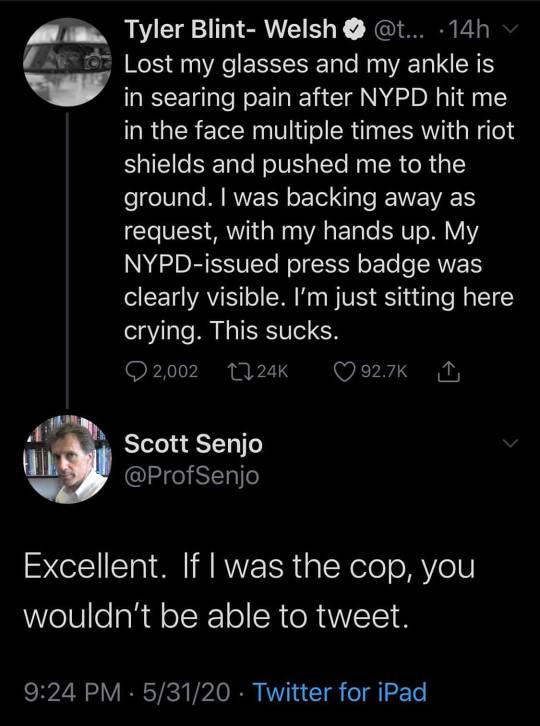

Sure would be a shame if this got spread around and he lost his job 💅🏽
133K notes
·
View notes
Text
So the song was mistaken?
I was wondering where the notion of Muhammad being the final prophet came from, since it’s not mentioned explicitly in the Quran and it seems somewhat at odds with another idea presented in the Quran, that each community will receive its own prophet from God, and apparently it rests on one single ambiguous verse (plus later hadith of course):
Muhammad is not the father of any of your men, but (he is) the Messenger of Allah, and the Seal of the Prophets: and Allah has full knowledge of all things.
Where “Seal of the Prophets” is interpreted to mean “last”.
Very reminiscent of how the Pope bases all his authority on that one line where Jesus tells Peter he’s the rock on which the church will be built.
103 notes
·
View notes
Photo
In any case, I’m surprised no one has questioned the premises. According to Media Monitors, “The Joe Rogan Experience is number one among men and women, in every income bracket, among listeners of any education level and in every region.”
And, from a different page, “Joe Rogan’s listeners are largely representative of the majority of podcast listenership, but his popularity blows away the competition. According to our survey respondent demos, Joe’s listenership is 71% male and evenly split between high school and post-secondary graduates.”
That’s still going to be a lot of women. And the last person in my personal life to spontaneously bring up the name of Joe Rogan in what at least sounded like a approving tone was a woman, so there’s one more anecdatum, I guess.

62K notes
·
View notes
Text
“How is any minority supposed to feel safe going into his class?”
Can someone explain this leap? Taking the guy’s comment at face value, it reveals, at worst, a thuggish, authoritarian attitude towards reporters, with no indication at all the he has a particular animus against ‘minorities’ unless news reporters are being counted as a minority here.
(And I guess the steelmanned version is that he has come to see the press and the rioters as fundamentally on the same team, not actually a difficult conflation to make given the number of articles that have come out either downplaying the riots or outright trying to justify them)


Sure would be a shame if this got spread around and he lost his job 💅🏽
133K notes
·
View notes
Text
Okay, but Obama isn’t black, in anything like the central sense. He’s half white, half East African, and his skin tone is in fact relatively pale. In order to claim the algorithm is biased (for sensible definitions of bias meaning ‘systematically tending to make mistakes in one direction , and not in the opposite direction), you would need to show that if you amass lots of photos of people with that particular skin tone and hair colour, it is more likely to resolve their facial features into European-looking, rather than mixed-European/East-African-looking, than the proportions in which people of those sets of ethnic backgrounds are included in the original photo set.
One gets the impression that often the complaints of bias in machine learning are not actually complaints that the machine outputs inaccurate results with a consistent skew relative to the inputs, but that they output results which are unskewed relative to the input but have political implications that we don’t like. In this case, Obama’s image is so well known that any human can easily recognise him from the pixelated version, but the machine doesn’t know that ... and if the machine’s input does in fact contain enough photos of people of European descendants whose pixelated versions have the same colour palate as the pixelated Obama photo, then resolving it to a European set of facial features is not bias, it’s just what you get if you don’t pre-programme it to recognise one particularly well-known mixed-ethnicity guy.
Depixellation? Or hallucination?
There’s an application for neural nets called “photo upsampling” which is designed to turn a very low-resolution photo into a higher-res one.
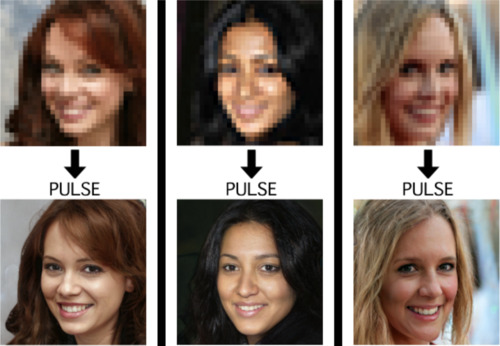
This is an image from a recent paper demonstrating one of these algorithms, called “PULSE: Self-Supervised Photo Upsampling via Latent Space Exploration of Generative Models”
It’s the neural net equivalent of shouting “enhance!” at a computer in a movie - the resulting photo is MUCH higher resolution than the original.
Could this be a privacy concern? Could someone use an algorithm like this to identify someone who’s been blurred out? Fortunately, no. The neural net can’t recover detail that doesn’t exist - all it can do is invent detail.
This becomes more obvious when you downscale a photo, give it to the neural net, and compare its upscaled version to the original.
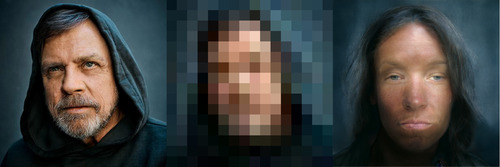
As it turns out, there are lots of different faces that can be downscaled into that single low-res image, and the neural net’s goal is just to find one of them. Here it has found a match - why are you not satisfied?
And it’s very sensitive to the exact position of the face, as I found out in this horrifying moment below. I verified that yes, if you downscale the upscaled image on the right, you’ll get something that looks very much like the picture in the center. Stand way back from the screen and blur your eyes (basically, make your own eyes produce a lower-resolution image) and the three images below will look more and more alike. So technically the neural net did an accurate job at its task.
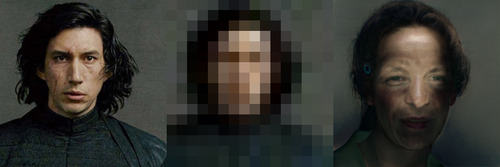
A tighter crop improves the image somewhat. Somewhat.
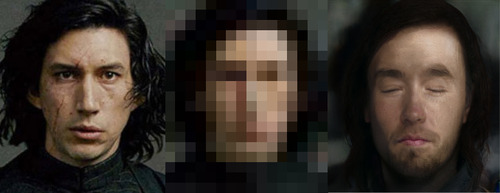
The neural net reconstructs what it’s been rewarded to see, and since it’s been trained to produce human faces, that’s what it will reconstruct. So if I were to feed it an image of a plush giraffe, for example…

Given a pixellated image of anything, it’ll invent a human face to go with it, like some kind of dystopian computer system that sees a suspect’s image everywhere. (Building an algorithm that upscales low-res images to match faces in a police database would be both a horrifying misuse of this technology and not out of character with how law enforcement currently manipulates photos to generate matches.)
However, speaking of what the neural net’s been rewarded to see - shortly after this particular neural net was released, twitter user chicken3gg posted this reconstruction:
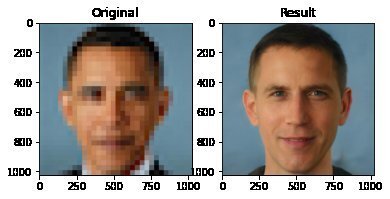
Others then did experiments of their own, and many of them, including the authors of the original paper on the algorithm, found that the PULSE algorithm had a noticeable tendency to produce white faces, even if the input image hadn’t been of a white person. As James Vincent wrote in The Verge, “It’s a startling image that illustrates the deep-rooted biases of AI research.”
Biased AIs are a well-documented phenomenon. When its task is to copy human behavior, AI will copy everything it sees, not knowing what parts it would be better not to copy. Or it can learn a skewed version of reality from its training data. Or its task might be set up in a way that rewards - or at the least doesn’t penalize - a biased outcome. Or the very existence of the task itself (like predicting “criminality”) might be the product of bias.
In this case, the AI might have been inadvertently rewarded for reconstructing white faces if its training data (Flickr-Faces-HQ) had a large enough skew toward white faces. Or, as the authors of the PULSE paper pointed out (in response to the conversation around bias), the standard benchmark that AI researchers use for comparing their accuracy at upscaling faces is based on the CelebA HQ dataset, which is 90% white. So even if an AI did a terrible job at upscaling other faces, but an excellent job at upscaling white faces, it could still technically qualify as state-of-the-art. This is definitely a problem.
A related problem is the huge lack of diversity in the field of artificial intelligence. Even an academic project with art as its main application should not have gone all the way to publication before someone noticed that it was hugely biased. Several factors are contributing to the lack of diversity in AI, including anti-Black bias. The repercussions of this striking example of bias, and of the conversations it has sparked, are still being strongly felt in a field that’s long overdue for a reckoning.
Bonus material this week: an ongoing experiment that’s making me question not only what madlibs are, but what even are sentences. Enter your email here for a preview.
My book on AI is out, and, you can now get it any of these several ways! Amazon - Barnes & Noble - Indiebound - Tattered Cover - Powell’s - Boulder Bookstore
15K notes
·
View notes
Photo
I don’t know, the one about “what lies do you find yourself believing” sounds like an invitation to take seriously the challenge of Paul Graham’s What You Can’t Say, to ask yourself if you have any beliefs that you would be uncomfortable expressing among your friends, and, if you don’t, to notice what a suspicious coincidence that is.
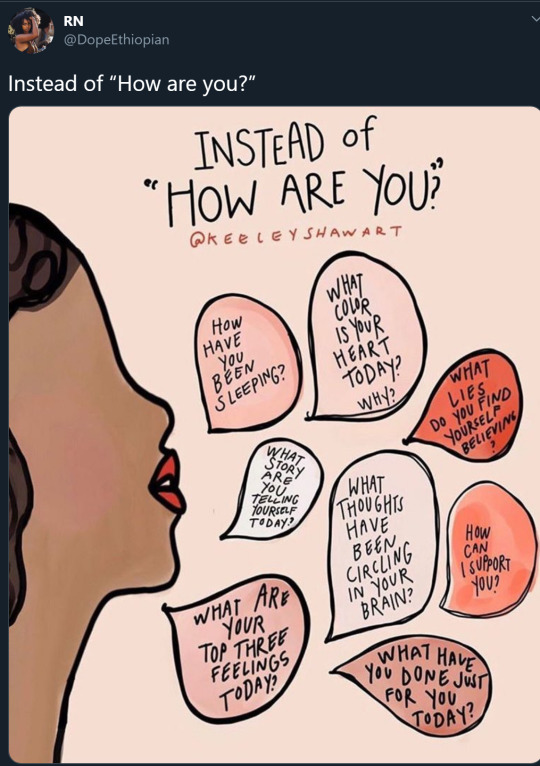
if someone asked me “What color is your heart today? Why?” instead of “how are you” I would murder them in cold blood.
113K notes
·
View notes
Text
As a name which reflects what the holiday is about, ‘Juneteenth’ does very badly. The thing is, that it looks like a name which has been consciously chosen to forego telling you what it’s about, in favour of telling you when it is, which it...also does somewhat badly at. If it was called ‘Emancipation Day’ or something like that, this wouldn’t be an issue.
Tbh they could have done a little better if they wanted to make it easy to remember what day Juneteenth is
116 notes
·
View notes
Text
Presumably people would just come up with another term that means the same thing, and if you then try to get them to stop using that, you’ll just get a euphemism treadmill, as long as the term points to a concept that people actually want to refer to. As far as I can work out, the word just means something like ‘produced within a culture that is relatively low down the tech tree, with relatively simple tools*, and techniques that require a lot of human labour input relative to what the state-of-the-art technique is’, which seems like something it would be difficult to get people to give up the idea of having a word for.
(*including conceptual tools, so, for example, mediaeval European art would be primitive relative to art from after people had worked out perspective)
I concede that it would be weird to apply the term strictly to black and indigenous artists, regardless of the level of technological sophistication that goes into their art relative to that produced by other people ... but I’d be surprised if an above-lizardman’s-constant number of people actually were using the word in that way, and I’d expect that it was more likely that a higher fraction of black and indigenous artists were consciously using the relatively low-tech techniques of their ancestors.
what if we stopped using the word “primitive” to describe the artistic interventions and practices of black and indigenous artists
6K notes
·
View notes
Text
I think part of the problem is just the English language not having enough suffixes. If we could distinguish [demographic] supremacy, meaning something like ‘the condition of [demographic] having special legal privileges that other demographics don’t get, from [demographic] supremacism, meaning support for the proposition that [demographic] should have special legal privileges (or should continue to, if they currently do), then the confusion disappears. 1950s Alabama can fairly be called a white supremacist society in the sense that it actually had white supremacy, and the Black Hebrew Israelites can fairly be called a black supremacist group in the sense that that actually support black supremacism, but the agent suffix “-ist” has to do double duty.
(As an aside, I assume that most [demographic] supremacists support special privileges for [demographic] because they think that [demographic] are the best people and deserve special privileges, but I guess that it is possible to believe ‘[demographic] are the best people, and will therefore naturally come out on top in any fair competition, so they don’t need any special privileges’ but I’m not sure if there is a specific term for people who take that view)

The dude who was on a cop show thinks black supremacy is a thing? I’m like not shocked but I’m still disgusted.
This reminds me of when straight cis people get pissy because they found out the A was meant for asexual and aromantic people, not straight allies, and they said that without straight people we just looked bitter and aggressive.
Conversations about marginalized groups demanding to be treated like human beings doesn’t lead to “supremacy” or “reverse racism” and honestly if a person of color wants to be bitter towards white people after a lot of the shit our race has done throughout history all the way to today I genuinely can’t blame them and refuse to call it supremacy.
So yeah fuck you dude.
617 notes
·
View notes
Text
Perhaps a minor point, but
They are about saying that this man was a great man and he did great things. That is not true. He was a slave trader and a murderer.
...strikes me as utterly bizarre. Porque no los dos dot jpeg? If you were a slave trader and a murderer, then I’m happy to accept, in the absence of strong contrary evidence, that the evil that you did outweighs the good, but he seems to be implying that it’s impossible for the same person to have both great and terrible things on their record sheet.
‘Statues are not the mechanism by which we understand history. We learn history through museums, through books, through television programmes. Statues are about adoration. They are about saying that this man was a great man and he did great things. That is not true. He was a slave trader and a murderer.’
- historian David Olusoga on BBC News, regarding the statue of Edward Colston being pulled down by BLM protestors in Bristol, and the “erasing history” argument used to criticise the act.
21K notes
·
View notes
Text
Okay, but in this particular case, the CDC initially messed up about as badly as it is possible for them to have messed up (and/or cynically lied to the public who they ought to have been offering good advice to). They come of this basically looking like Ayn Rand villains. If the guy had been listening to the right set of smart contrarians, he would have been far better prepared for the crisis than if he had been uncritically following the CDC.
Sure, he’s wrong now, but he would have been just as wrong if he’d followed CDC’s initial advice.

40K notes
·
View notes
Photo
Where is he getting those figures from? The number of daily gang-related murders seems about right according to these numbers (though a quick search around seems to suggest that no one actually has a good handle on how many of the c.15000 annual murders in the USA are actually gang-related, and some people put the percentage much higher).
But the figure for police murders? The figure of 2.7 per day seems to be about right for the number of fatal police shootings, but fatal police shootings is a very different thing from police murders. Assuming that fatal police encounters that involve some other cause of death than firearms is small enough to ignore (I’m not sure if that’s true, but I’m not having much luck diggin up numbers), we need to know how many of those killings 2.7 per day are actually murder, and how many are justified self defence or defence of others.
Just picking one recent month at random from Wikipedia’s database (which does list killings by all methods, not just shootings, but doesn’t seem to keep tabs on how many of those killings are by the police rather than by everyone involved in the altercation) ... and having a skim through, a lot of those police killings are killings of people who were pointing a gun at the police, or otherwise attacking or threatening the police, or attacking other people, where describing it as ‘murder’ would be nonsense; some others are more ambiguous, and a few do indeed seem to be entirely unjustified killings based on the description.
Then again, picking another month, there are only two killings there which read unambiguously as situations where the police had reasonable fear for their lives (and hadn’t initiated the confrontation themselves), but then there are only five killings listed for that month, a much lower figure than the 2.7 per day, so I’m not sure what to make of it, but overall, if the claim is that the police commit 2.7 murders per day, I’d be curious where that figure came from. I’d also want to find out how many of the alleged 6 per day murders by the police are actual murders as opposed to non-murder killings in the line of duty.
And I’d also be a bit skeptical of the lack of change in the base rate for gang killings. Lets say for the sake of argument that the change from 2.7 per day to 6 per day killed by the police is correct during these chaotic times. Well, if you were a gangster, wouldn’t you take the opportunity of the police being tied up policing riots (or, yes, policing peaceful protests while ignoring the riots and looting going on nearby), to settle old scores with your rivals or attempt to take over new turf? I’d be very surprised if the number of police killings has gone up by such a large fraction without the number of gang-related killings also going up substantially.
I’m reminded of the reports of Chicago’s deadliest weekend, reported at the beginning of the current chaos, with 24 fatally shot over 30th May to 1st June. I don’t know what fraction of those will be gang related, but extrapolating from the National Youth Gang Centre’s figures linked earlier, in which about 13% of the total homicides are gang-related, that would make 3 of Chicago’s killings over two days gang-related, which, if the base rate for the rest of the country had stayed the same, would mean that Chicago alone was accounting for something like a quarter of all the USA’s gang-related killings that weekend. Which could be true - Chicago may be a massive outlier - but it seems prima facie implausible. If the person quoted in the screenshots above isn’t giving the source of their figures, and isn’t specifying whether or not they are claiming a change in the rate of gang killings, I’m skeptical.
Of course, none of the above should be taken to imply that there aren’t major problems with American police violence that are worth trying to solve; just that the specific claim that they have become more murderous, in aggregate, than gangsters, in aggregate, is such a wild claim that we really ought to see the sources before taking it as a given.

58K notes
·
View notes
Photo
This seems like an astonishingly uncharitable take. I mean, it’s *possible* that someone who claims to be concerned about illegal immigrants eroding the bargaining power of the existing working class population is in fact motivated by racial bigotry, but the onus is on you to prove that. Good evidence would be something that tends to disprove the hypothesis that net immigration drives down wages enough that a person whose wages were at risk would be right to worry about.
This particular case, of someone who has lived in the USA for over 30 years, from a young enough age to be as fully integrated into the local culture as anyone born there and who could well be generally a likeable personality that people are well-disposed to, doesn’t seem like particularly strong evidence - we don’t even know what his job is; to what degree he competes with the sort of demographics that tend to complain about being affected by illegal immigration - but even if he is, it’s entirely possible for this one guy to pass as ‘one of us’ well enough that your average Trump supporter isn’t going to parse him as basically as American as anyone else, *and* for the large-scale-illegal-immigration-depresses-wages hypothesis to be true.
That is to say, it’s possible that he is a good cultural fit, regardless of the colour of his skin. We would need to hear from people of other ethnic backgrounds who have otherwise the same basic backstory before we can conclude that everyone concerned about illegal immigration is motivated simply by irrational racial bigotry.

It’s not about “illegals stealing our jobs,” it’s about not being white. If anyone tells you otherwise they are lying.
106K notes
·
View notes
Note
Also, it’s easy to lose sight of the distinction between ‘Chauvin’s actions were/weren’t okay’ and ‘Chauvin’s actions were/weren’t in themselves proof of racism justifying the protests’. Not that that is necessarily what’s going on here, just that some of the people who sound like they are justifying Chauvin may just be arguing for the claim that the current protests are in response to a perceived problem that Chauvin isn’t actually evidence for.
Have you seen Floyd's criminal record? He held woman at a gunpoint and beat her to get drugs. Stop making him the saint.
I’ve literally said nothing about George Floyd as a person, but okay.
282 notes
·
View notes
Photo
I think there’s a reasonable objection here, in that ‘learning how to meet a deadline/study sufficiently in advance of the test’ is a general skill which is likely to be as valuable as learning the actual contents of the test. There’s only so many times you can re-take it on class time until it starts to seriously eat into the time for learning other things. Obviously you don’t need to be needlessly hostile about it, but setting expectations that the children will get it done in time doesn’t strike me as inherently unethical.

These policies can help to improve the mental health of students
186K notes
·
View notes
Link
While I don’t take quite such a pessimistic position as brazenautomaton on the question of whether everyone pushing this view is doing so out of malice, I would add that those who do argue this issue would be a lot more persuasive if they could present quantifiable data showing that members of the groups that they are arguing on behalf of do in fact face significantly greater hostility on average from their fellow hobbyists.
At a first pass, some sort of survey with a question that is not too much of a leading question, something like ‘how long ago was the last time you were made to feel unwelcome at a [hobby] event, and can you describe what happened?’ might be useful. If one group gives significantly shorter time-since-last-hostility, or describes significantly more hostile events as judged by third parties with no knowledge of the demographics of the respondents, then that would in fact be good evidence in favour of the hypothesis that people of that demographic do face greater hostility within the hobby.
Maybe that research has already been done in tabletop gaming and I just haven’t seen it, but if so, the linked article ought to mention it.
The linked article wasn’t specifically about this, but it’s worth summoning Slate Star Codex here, making the point that the mere fact that a demographic is statistically underrepresented in a hobby relative to its percentage of the general population is never sufficient to prove that that hobby is hostile to that demographic unless you have eliminated all other plausible explanations for the disparity.
VarianceHammer wrote this much better than I could.
2K notes
·
View notes
Text
Lara Croft as you’ve never seen her before :-)
How has no one made an archaeology VR game? A game where you gotta trowel the dirt, wash artifacts, make excavation drawings, photograph the site, uncover burials and caches. All from around the world and from numerous time periods. It would be educational and fun!
738 notes
·
View notes